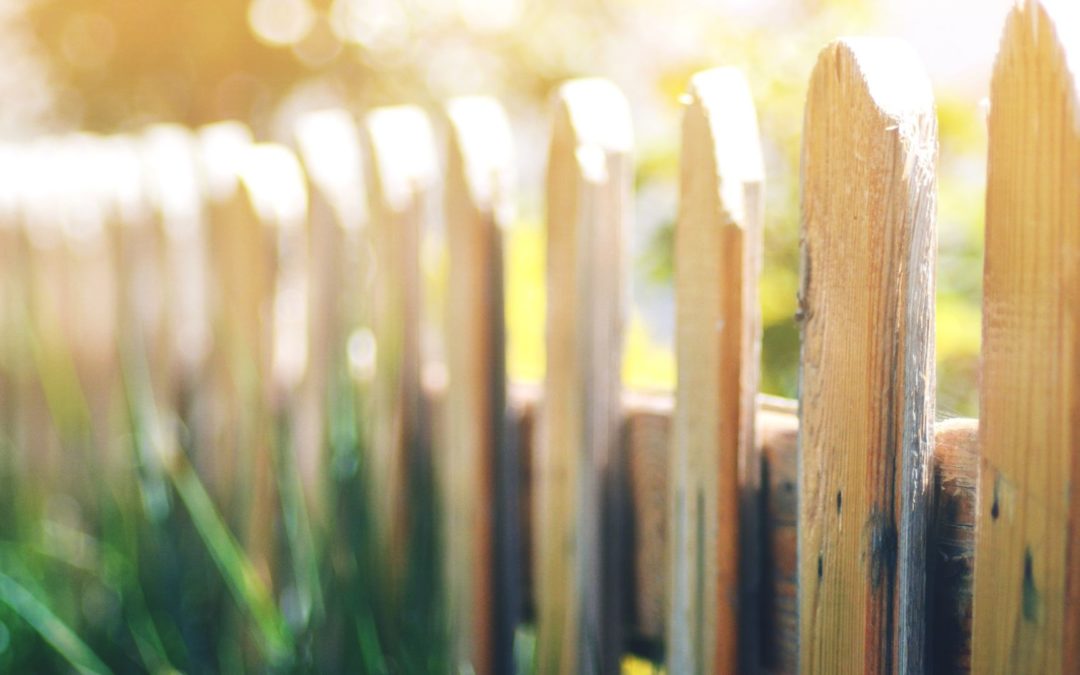
We’ll walk you through all the different types of fences available and discuss important factors like budget, maintenance, and local regulations.
Plus, we’ll give you plenty of options for height and privacy so that you can create the garden oasis of your dreams.
So let’s get started on this exciting journey!
Key Takeaways
– Consider the purpose of the fence, such as privacy, security, or decoration, when choosing the right garden fence.
– Take into account factors like budget, maintenance requirements, local regulations, and compatibility with the landscape when making your decision.
– Explore different height and privacy options, such as trellis panels, planting hedges or shrubs, slatted fences, or decorative screens.
– If you live in a conservation area, consult with local authorities and obtain the necessary permissions to ensure you preserve the character of the area.
Types of Garden Fences
There are various types of garden fences available, such as close-board, larch-lap panel, timber palisade, slatted fence panels, and hit & miss fencing. When it comes to choosing the right fence for your garden, there are several factors to consider.
One important decision to make is whether you prefer a wooden or metal fence. Wooden fences offer a natural and traditional look, while metal fences provide durability and security.
Another option to consider is vinyl fencing, which offers numerous benefits such as low maintenance and long-lasting durability. Vinyl fences are resistant to rotting, warping, and fading, making them an excellent choice for those seeking a low-maintenance option.
Choosing the right fence color is also an important consideration. Lighter colors can make your garden appear more spacious and open, while darker colors provide a bold and dramatic look.
If you’re planning on installing the fence yourself, there are some DIY installation tips to keep in mind. Make sure to measure the area accurately before purchasing materials and always follow the manufacturer’s instructions for proper installation techniques.
Lastly, when comparing fencing materials, consider factors such as cost, maintenance requirements, and style compatibility with your landscape. Each type of fencing material has its own advantages and disadvantages that should be carefully considered before making a final decision.
Additional Considerations for Your Garden Fence
When considering your garden fence, you should take into account additional factors such as the type of fence posts and the option to paint timber.
Fence post options play a crucial role in determining the strength and durability of your fence. You can choose between timber, concrete, or galvanized steel posts. Timber posts are a popular choice for their natural look, but they require regular maintenance to prevent rotting. Concrete posts offer excellent stability and longevity but may not blend well with certain landscapes. Galvanized steel posts provide superior strength and are resistant to rusting.
Another factor to consider is painting options for timber fences. Timber can be painted in various colors to match your aesthetic preferences or blend with the surroundings. However, it’s important to note that PVC fences cannot be painted.
Wind protection is another consideration when choosing a garden fence. If wind protection is a priority, you can opt for concrete or Durapost fence posts which offer better resistance against strong winds. Alternatively, choosing fencing with gaps allows wind to pass through, reducing the risk of damage.
Budget considerations and maintenance requirements should also be taken into account when selecting your garden fence. Different types of fences have varying costs associated with materials and installation. Additionally, some fences may require more frequent maintenance than others.
Factors to Consider When Choosing a Fence
Consider factors such as the purpose, budget, maintenance requirements, local regulations, and compatibility with your landscape when you’re deciding on the ideal fence for your garden.
Maintenance requirements are an important consideration when choosing a fence. Some materials may require regular upkeep, such as painting or staining, while others may be more low-maintenance. It’s essential to take into account your available time and resources for maintaining the fence.
Local regulations also play a significant role in selecting a fence. Different areas have specific rules regarding height restrictions, materials allowed, and even design guidelines. Be sure to check with your local authorities to ensure compliance with these regulations.
Budget considerations are another crucial factor. Fences come in various materials and styles that vary in cost. Determine how much you’re willing to spend on your garden fence and look for options that fit within your budget.
Compatibility with your landscape is also vital when choosing a fence. Consider how the fence will blend in with the overall aesthetics of your garden and whether it complements existing structures or features.
Finally, wind protection options should be taken into account if you live in an area prone to strong winds. Certain types of fences provide better wind resistance than others. Concrete or Durapost posts can help increase stability and minimize damage during windy conditions.
Height and Privacy Options for Your Garden Fence
If you’re looking for more privacy in your garden, you can explore options such as trellis or lattice panels, planting hedges or shrubs, slatted fences, or decorative screens.
Trellis panels offer a versatile option that allows you to incorporate climbing plants for added privacy and visual appeal. You can choose from various designs and materials to suit your preferences.
Lattice panels provide a similar effect but with smaller openings, allowing for less visibility while still maintaining airflow and natural light.
Planting hedges or shrubs along your fence line is another effective way to enhance privacy in your garden. These living barriers not only provide seclusion but also add beauty and greenery to your outdoor space. Choose dense evergreen varieties for year-round coverage or deciduous options that provide seasonal interest.
Slatted fences are becoming increasingly popular due to their modern aesthetic and practical benefits. The gaps between the slats allow air circulation while offering partial privacy. This design also allows sunlight to filter through, creating an inviting atmosphere in your garden.
Decorative screens are another attractive option to consider. They come in various styles, patterns, and materials, allowing you to customize the level of privacy and visibility they provide. These screens can be placed strategically throughout your garden to create secluded areas without sacrificing style.
When choosing the right height and privacy options for your garden fence, it’s important to consider factors such as the desired level of seclusion versus visibility, incorporating plants for added privacy and beauty, selecting slatted fences for their practical benefits, and choosing decorative screens that complement your personal style while providing the desired amount of privacy.
## Conservation Area Considerations for Garden Fencing
Living in a conservation area requires consulting with local authorities and obtaining necessary permissions before making any changes to your garden fence. The consultation process is important to ensure historical preservation and maintain the character of the area. When considering design alternatives for your garden fence, it’s crucial to take into account material restrictions imposed by local regulations.
Before proceeding with any modifications, you must obtain permission from the appropriate authorities. Failure to do so can have serious consequences, including legal implications, forced removal of the fence, damage to your reputation, difficulty selling your property, and increased tension with neighbors.
When seeking permission for changes to your garden fence in a conservation area, it is essential to propose design alternatives that are sympathetic to the historical context. This may involve using specific materials or replicating traditional styles. Being mindful of these requirements will help preserve the unique charm and aesthetic appeal of the area.
Consequences of Not Getting Permission for Your Garden Fence
Not obtaining permission for your garden fence can result in legal implications, forced removal, and damage to your reputation.
It is crucial to understand the potential consequences of proceeding without the necessary permissions. Firstly, there are legal implications involved when installing a fence without proper authorization. You may face fines or even legal action from local authorities. Additionally, you could be forced to remove the fence entirely, resulting in wasted time and resources.
Moreover, not obtaining permission can lead to damage to your reputation within your community. Your neighbors may view you as someone who disregards rules and regulations, causing tension and strained relationships. This can make it difficult for you to sell your property in the future if potential buyers have concerns about unresolved disputes with neighbors.
It is important to consider the long-term effects of not getting permission for your garden fence. By taking the necessary steps to obtain approval from relevant authorities and consulting with your neighbors, you can avoid these potential pitfalls and maintain positive relationships within your community.
Remember that open communication and respect for regulations are key factors in ensuring a harmonious living environment for everyone involved.
Tips for Choosing and Installing Wooden Fence Panels
Now that you understand the consequences of not obtaining permission for your garden fence, let’s move on to some tips for choosing and installing wooden fence panels.
By following these guidelines, you can ensure that your fence not only looks great but also stands the test of time.
Firstly, it’s important to choose the right materials for your fence. Wooden panels are a popular choice due to their natural beauty and versatility. However, they do require proper maintenance to enhance their durability. Regular cleaning, staining or painting, and sealing can help protect the wood from weathering and rotting.
If you’re considering a DIY fence installation, make sure you have the necessary skills and tools. It’s crucial to accurately measure your space and properly install the posts and panels to ensure stability. Additionally, using concrete spurs or full concrete posts can prevent rotting and facilitate easier panel replacements in the future.
Alternatively, hiring professionals for fence installation offers numerous benefits. They have the experience and expertise to handle any challenges that may arise during the process. Professional installers also have access to high-quality materials and can ensure that your fence is installed correctly for maximum durability.
Whether you choose to install your fence yourself or hire professionals, taking these tips into consideration will help you choose the right wooden fence panels and ensure a successful installation that enhances both the aesthetics and functionality of your outdoor space.
Final thoughts
In conclusion, choosing the right garden fence is crucial to meet your specific needs and preferences. By considering factors such as purpose, budget, maintenance requirements, and local regulations, you can make an informed decision.
For example, let’s imagine a case study where a homeowner wanted to create a private oasis in their backyard. They opted for a slatted fence with trellis panels on top, allowing them to enjoy privacy while also incorporating climbing plants for added beauty.
Remember to always obtain necessary permissions and consider conservation area regulations to avoid potential consequences.
With these tips in mind, you can select the perfect garden fence for your outdoor space. If you want to upgrade your existing fence or install a brand-new one give us a call today 07988 733 972

